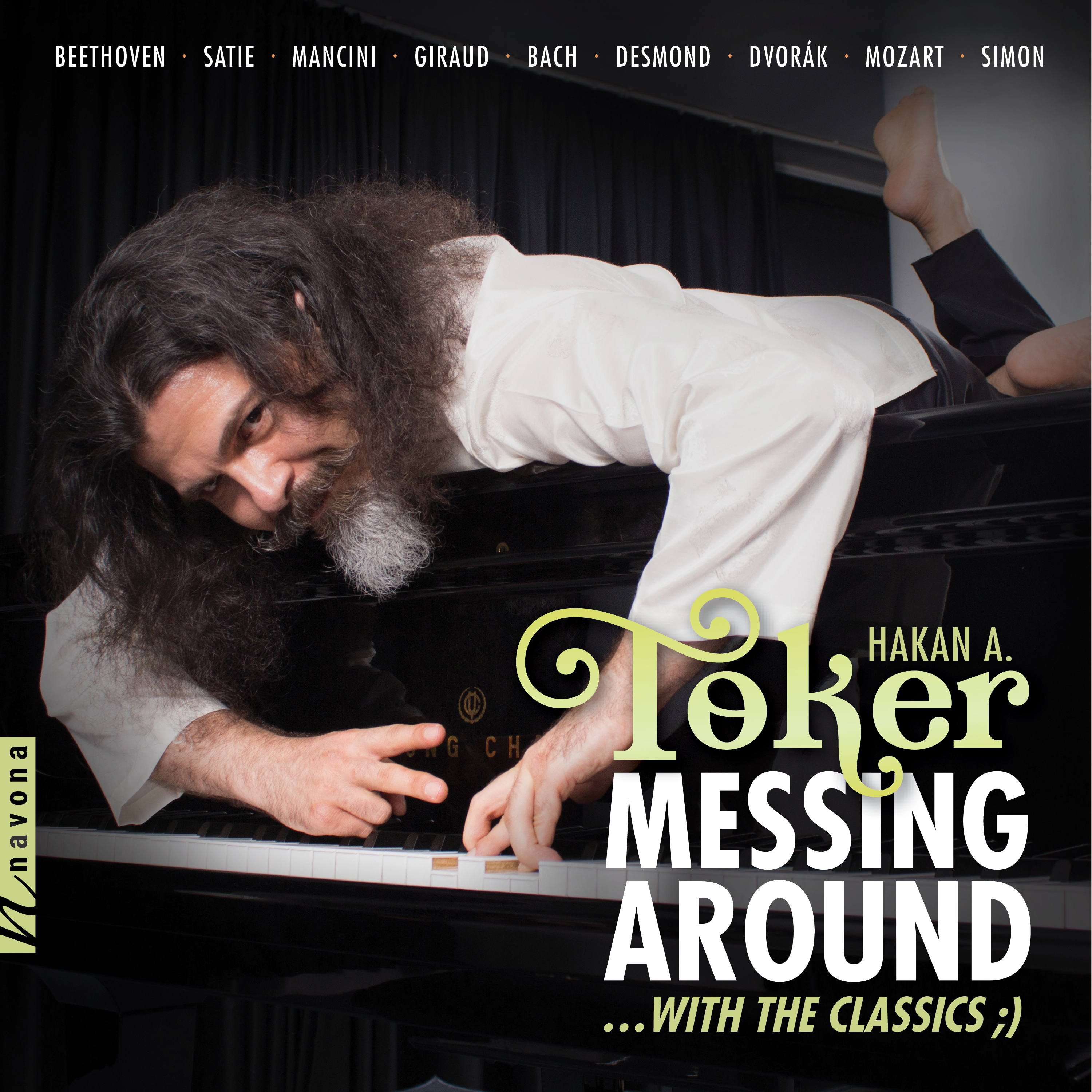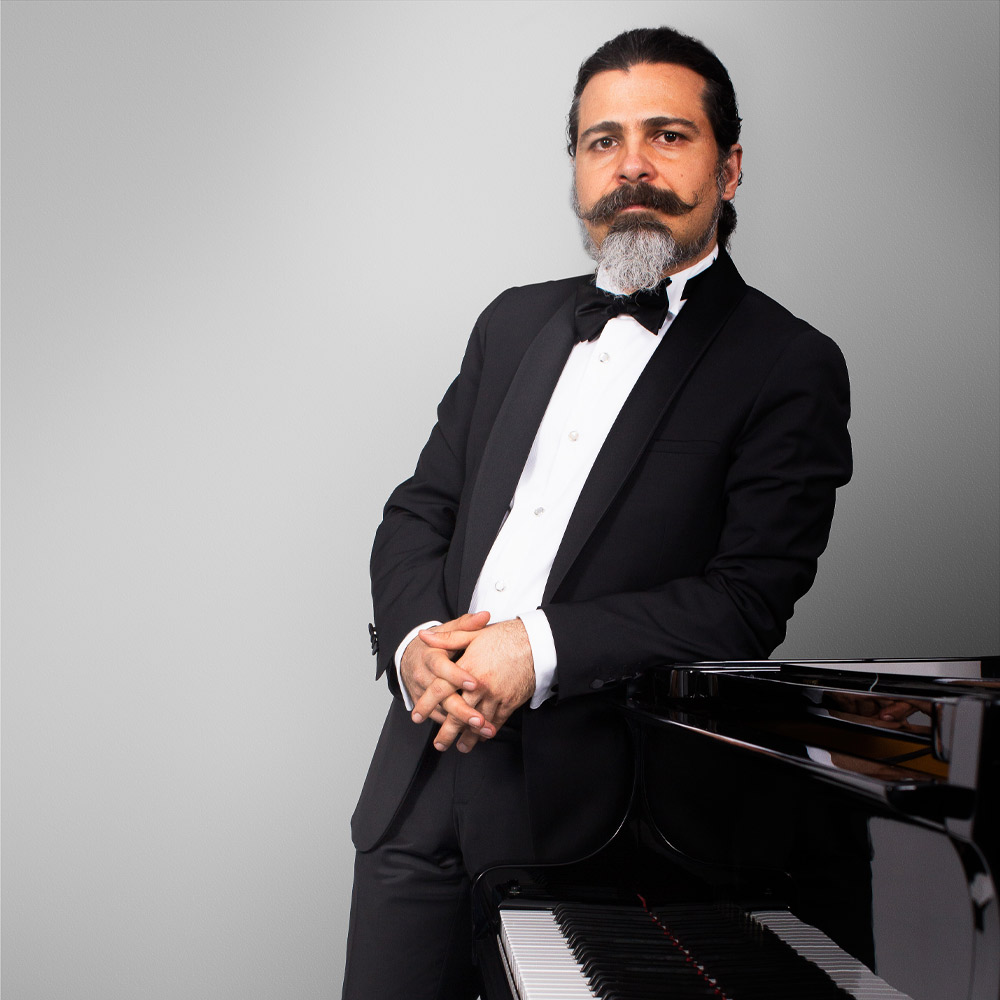
Pianist, composer, and accordionist Hakan A. Toker is from Mersin Turkey. He studied classical music in Turkey and the United States, graduating from Indiana University School of Music (BM), where he double majored in piano and composition. Besides his formal education, he is mostly self-taught in the fields of improvisation, jazz, and world music.
To date, he has performed in 28 countries and taken stage in many international festivals. He has collaborated with many symphony orchestras, ensembles, singers, dancers, poets, jugglers, acrobats, actors, and actresses, and has been a member of bands in the United States and Turkey. He has performed many classical and improvised recitals, informative concerts, music for silent films, multimedia, and musical-comedy shows.
Hakan is particularly known for his interpretations of Turkish music and his amazing interactive improvisations, commanding a multitude of styles and genres. He has taken part in symposiums in many educational institutions and given masterclasses internationally.
Hakan livestreams every Wednesday at 9pm Turkey Time (TRT) from his personal Facebook page: facebook.com/hakan.a.toker.7
Today, Hakan is our featured artist in “The Inside Story,” a blog series exploring the inner workings and personalities of our artists. Read on to discover what happened when Hakan forgot the music in the middle of a concert with the Izmir State Symphony…
Who were your first favorite artists growing up?
Throughout my teens, I was a huge fan of Johann Strauss Jr. and 19th-century Viennese dance music in general. While my peers listened to rock in order to get their rocks off, Viennese waltzes, polkas, and gallops were my rock! Strauss was my Elvis! I liked to listen to it loud, in a state of ecstatic joy.
Chopin and Rachmaninoff were my other favorites, and fed my passion for intricate, romantic piano music. This music perfectly expressed my hopeless love life at the time! I strove to write like my heroes, although I was discouraged by my teachers in the composition department who wanted me to turn to modern music, none of which touched my feelings like these guys did.
When I discovered Strauss waltzes paraphrased for piano by romantic virtuosi such as Schulz-Evler, Grünfeld, and Dohnányi, I was thrilled to find my two passions united in one!
Along with these, I listened to a lot of Turkish traditional artists such as Tamburi Cemil Bey, Münir Nurettin Selçuk, Müzeyyen Senar, Zeki Müren, etc.. After years of soaking up all of the above, I came up with my own pianistic transcription of Turkish waltzes in my album Turkish Music on Piano which is now downloadable for free on my website.
When did you realize that you wanted to be an artist?
It was around the ages of 10-12, when I realized how much of an impact my playing was beginning to have on people besides the fun I was having on my own. It’s the perfect way to connect with people – lots of people, many of whom you don’t even know personally – in an intimate way. It’s a very satisfying win-win situation: one gets to entertain while being entertained, to touch while being touched. How else can one share something intimate with a wide audience without sacrificing sincerity?
What was your most unusual performance, or the most embarrassing thing that happened to you during a performance?
I love surprises! Some of my favorite moments of any concert are the ones when something goes wrong unexpectedly: because then one has to improvise a solution, which is the most exciting part! In 2000, while I was playing Rachmaninoff’s 1st Piano Concerto during a concert with the Izmir State Symphony in Turkey, my memory slipped! I had to go on, so I started making up stuff! I invented a repeat that wasn’t there. Of course, as a result, for a short while, the orchestra and the piano parts did not quite match : D To make it worse, the orchestra’s part was rather sparse and accompanimental at that moment; there wasn’t much for me to latch onto! Luckily, the experienced conductor Mr. Tadeusz Strugała leaned towards my ear and whispered the tune I was supposed to be playing! I caught on right away. After the concert, my grandpa who had hardly been to a concert in his life said to me “I didn’t know the custom of conductors whispering to soloists during performance! That was interesting.” : D
What is your guilty pleasure?
Messing around with the holiest of music! : D Many people – especially classical musicians – consider music an untouchable, sacred thing; especially because a lot of what we listen to is the work of genius. However, they miss the point: those genii like Bach and Mozart didn’t plop out into existence as masters. They actually became who they are through breaking music apart, messing around with it, and putting it back together in new ways. They were all great improvisers and they did not hesitate to mess with each other’s music and present their “messings” as a form of art! They were not given any privilege to do so from the heavens. They simply allowed themselves, and doing just that repeatedly for a long time made them masters of the art. All musicians need to allow themselves such things and get over the fear of sacrilege if they want to speak the language of music rather then merely read poetry out loud in a language they don’t understand but are merely trained to pronounce well.
If you could instantly have expertise performing one instrument, what instrument would that be?
I play the accordion and the kanun (traditional Turkish zither) besides the piano, which is my primary instrument. The former sings well, but lacks microtones which are needed for Turkish music. The latter has microtones, but can’t sing. If I had to pick another instrument, I think I would chose the harmonica. It’s a very expressive instrument that can sing well and produce any microtones, and you can play it hands-off, with the help of a neck-attached apparatus. To be able to accompany myself at the piano while playing singing phrases on the harmonica would be a dreamy experience – I say this because I have no hope of actually singing! I am a fan of Toots Thielemans.
What does this album mean to you personally?
I am an improviser – yes, there are millions of improvising musicians on the planet, but I am one of few remaining practitioners of the art of improvisation in classical music within the Lisztian pianistic tradition. I am more excited about creating arrangements like those on this album spontaneously during concerts, rather than via premeditation. This album is my call to concert organizers: if you like what you hear on it, invite me to play live and challenge me to do more devilish things with no advanced warning! And of course, this album is my call to new audiences: if you like what you hear on it, come to my concerts and challenge me to improvise on your ideas, themes, and phone numbers; for the thrill of that is nothing like hearing it on an album – both for me, and for them. Gotta taste it live to know what I mean ; )

TOKER MESSING AROUND…WITH THE CLASSICS ; ) will be available through Navona Records for streaming or purchase on January 11. Click here to pre-order.

Pianist, composer, and accordionist Hakan A. Toker is from Mersin Turkey. He studied classical music in Turkey and the United States, graduating from Indiana University School of Music (BM), where he double majored in piano and composition. Besides his formal education, he is mostly self-taught in the fields of improvisation, jazz, and world music.
